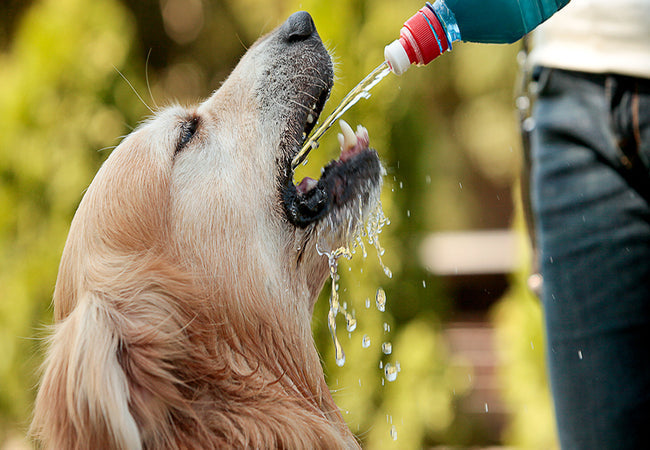2025 Vet Guide: Dog Dehydration – Signs, Causes, Treatment & Prevention 2025 💧🐾

In this article
2025 Vet Guide: Dog Dehydration – Signs, Causes, Treatment & Prevention 2025 💧🐾
By Dr. Duncan Houston BVSc
Dehydration removes essential fluids and electrolytes, compromising organ function and thermoregulation. Early recognition and rehydration can prevent serious complications. Here's what every pet parent should know. 🛡️
🔍 1. Why Hydration Matters
- Dogs are ~60–70% water—essential for digestion, circulation, temperature control, and cellular function.
- Fluid loss through panting, urine, vomiting, diarrhea, and fever can quickly deplete hydration.
⚠️ 2. Recognising Signs of Dehydration
Watch for these indicators:
- Skin tent test: Gently pinch skin over shoulders. If it returns slowly or stays up ("tented"), dehydration may be present.
- Dry or sticky gums: Gums become tacky, saliva thickens.
- Sunken eyes: Eyes appear deeply set.
- Dry nose: In hot or ill conditions, dryness is a red flag.
- Panting and lethargy: Excessive panting, weakness, and collapsed behavior suggests moderate to severe dehydration.
- Loss of appetite, vomiting, diarrhea: These wreak fluids and electrolytes.
- Rapid heart rate: Increased pulse is a serious sign of systemic impact.
🩺 3. Vet vs Home Care
- Home rehydration: Offer small, frequent sips or ice chips; avoid forcing water.
- Mild cases: Oral electrolyte solutions, chicken broth, monitor improvement.
- Moderate-severe: Vet care with subcutaneous or intravenous fluids; electrolytes, treat underlying cause.
🧩 4. Common Causes
- Environmental: Heatstroke, exercise, heat exposure.
- Gastroenteritis: Vomiting and diarrhea cause rapid fluid loss.
- Fever/illness: Infection or internal disease triggers dehydration.
- Endocrine/kidney issues: Diabetes, kidney disease, Cushing's, increased urination, and water loss.
- Increased output: Panting, urination, diarrhea/vomiting.
🏥 5. Diagnostics & Vet Actions
- Physical exam and hydration check (skin, gums, eyes).
- Blood tests, electrolytes, kidney function, and glucose.
- Urinalysis, if indicated.
- Fluid therapy tailored to severity.
- Treat underlying conditions like infections or endocrine disorders.
🏡 6. Prevention & Support at Home
- Daily hydration: 1 oz water per pound of body weight—adjust during heat and activity.
- Multiple stations: Keep bowls with fresh water in key spots.
- Electrolyte boosts: Broth or vet-approved solutions during illness or heat.
- Cooling strategies: Shade, fans, breaks during walks, limit midday exercise.
-
Track intake: Use tools:
- Ask A Vet for hydration support.
- Woopf to log fluids, symptoms, and vet care.
- Purrz for trend-tracking and reminders.
📚 FAQs
Q: How often should my dog drink?
On average, dogs need ~1 oz of water per pound daily. Provide more during exercise, illness, or hot weather.
Q: Is a dry nose always dehydration?
No—nose dryness isn’t a standalone sign. Combine with skin tent, gum moisture, and behavior before worrying.
Q: When to go to the vet?
If dehydration signs include skin tenting, sunken eyes, lethargy, vomiting, diarrhea, or sandy gums, seek vet attention promptly.
💬 Owner Insight
> “During a heatwave, my GSD started panting a lot and refused water. A vet gave fluids and an electrolyte solution—he bounced back fast!”
🏁 Final Thoughts from Dr Houston
Dehydration can escalate fast—but early detection, prompt rehydration, and addressing underlying issues help protect your dog’s health. Use Ask A Vet, Woopf, and Purrz to catch fluid loss early and support recovery throughout 2025 and beyond. 💙🐾
Download the Ask A Vet app for instant hydration triage, symptom logging, and veterinary guidance. 📱
AskAVet.com – Keeping pets hydrated, safe & strong.






